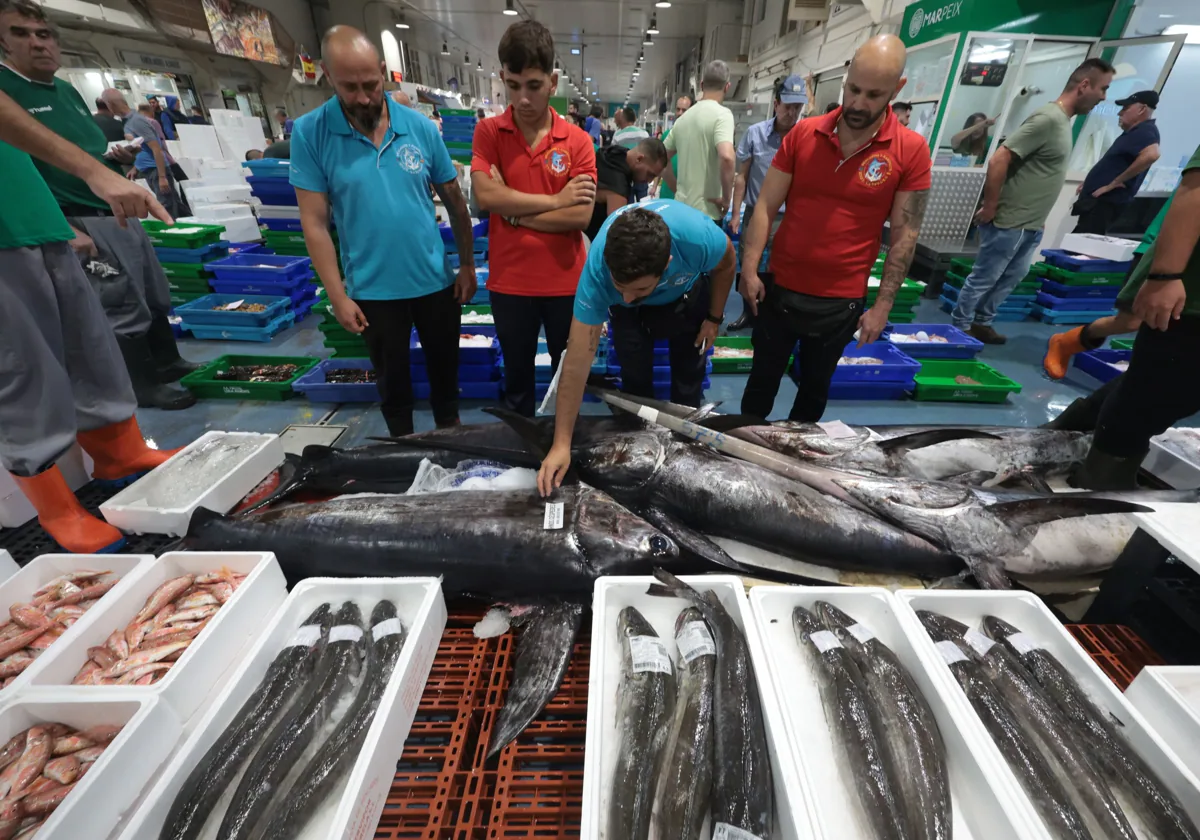Fish sales leap by 30% during summer months at the biggest wholesale market serving Malaga and the Costa del Sol
Mercamálaga is one of the largest in the whole of the Andalucía region and it starts operating when the rest of the city is still asleep. SUR went behind the scenes to witness the activity...
Mercamálaga, the largest wholesale fish market in the province, saw its sales increase by up to 30% this summer. The months of June, July and August are the high season for 'chiringuito' beach bars and catering businesses with the buying and selling of all kinds of species flourishes. The most popular product in Mercamálaga is the trio of bivalve molluscs: thin shell, mussels and clams. If we leave shellfish to one side, anchovies, sardines and blue whiting are also extremely popular.
A trip to Mercamálaga is a dive into the depths of the sea. To do so, in the middle of the night, before the siren sounds to signal the opening of the doors, is to witness organised chaos and a series of gestures and movements that represent the idiosyncrasies of Malaga. The workers here smell of the sea and the products are promoted loudly with bellowing voices. If someone is looking for characters for a documentary, there are plenty of them here.
The aisles of Mercamálaga are an organised chaos, where folklore coexists with pure and simple business
Mercamálaga is one of the largest wholesale markets in Andalucía. It starts operating when the rest of the city is still asleep. It is a large protein chamber from which more than 15,000 tonnes of fresh fish and more than 2,000 tonnes of frozen fish have been sold so far this year. It is a huge stage for Malaga's food culture. Some 1,300 people work here. Pepe Jiménez is one of them. Together with his brother Rafael, he runs Ravidepa. At 58 years of age, he occupies an important position in the fish distribution chain, where the fishermen's supply meets the fish processing companies. Fishmongers, beach bars and hotels are served here on a daily basis.
Pepe, who is a representation of the archetypal man of yesteryear, and who doesn't look like he's going to give up any time soon, is an essential link. A connection between the ports and the kitchens of Malaga, he buys to resell the product and feels the crises when they occur at the two ends of the chain. He is a professional who has been in the same place for more than 30 years and has seen crises come and go. "Everything is cyclical," he says as he places two sacks full of fine shells and then slams them down with his hands, the size of a small frying pan. "They are very expensive, at 17 euros a kilo," he adds.
When people are asleep, the Mercamálaga workers are at work. When most people order toast and coffee for breakfast, in the bars here you can already see men drinking beers. For Pepe, Mercamálaga is also something like home. "I can't explain why I feel so comfortable here," he says. "Here I have become who I am."
The here, now looks like a busy maze. It is 4.30am and the siren sounds. By 9am at the latest, the business is done. In between, the hustle and bustle is in full swing. Small vans are already parked in front of the warehouse and inside them, fish are filleted and tuna are gutted. It's a spectacle for which you could even charge admission. For a tourist attraction, it is perhaps a little too damp and too narrow.
Mercamálaga is also a treasure chest of untried products and unimagined creatures
There are polystyrene boxes that reach up to the ceiling, paper cartons, metal tubs and large ice caskets. Mercamálaga is also a treasure chest of untried products and unimagined creatures. There are shells as big as a soup plate, fish as silvery as aluminium foil and others with eyes like Liza Minnelli. Octopus pyramids, tuna as round as wine barrels and large knives. Pepe's nephew, in charge of this task, has biceps like Popeye. Every cut is a science. One wrong incision puts a fortune at risk.
Not everything is as romantic and idyllic as it seems. This is what Raúl Alvarado says. "I started in the fish business when I was 14 years old," he says. Overfishing and dwindling stocks would affect the business. "The situation is not exactly rosy," he says. He would often give just enough to survive. "I'm not saying that summer and Christmas are the most important times for us," he added.
Of the goods sold at Mercamálaga this summer, 82.83% corresponds to fresh fish, 8.09% to fresh seafood, 4.90% to frozen fish and 4.18% to frozen seafood.
It is no longer 5am, but 6am and it is rush hour at Alejandro Escobedo's stall, who works with live seafood. Human beings are attracted by the beautiful, but what is apparently not beautiful tastes better. A fish from an aquarium is inedible, an oyster from Escobedo is a delicacy - Mercamálaga is a huge showcase of marine life.
Sunrise
The first rays of sunshine are visible and brighten up the inside of the warehouse. The buyers inspect the wholesalers' fish with a magnifying glass, complain about the high prices and want to haggle. There is hardly any room for bargaining. Much of what you see is already sold to order. The demand for ice is enormous. A small factory on the site itself meets this need. As the hours go by, the tide goes out and the activity slows down. Some middlemen sit down for the first time and there are big yawns. The day's turnover is checked with the help of calculators.
Pepe's day, like everyone else's, always starts at night, when Malaga is still asleep. No one is surprised there are problems in handing over this work to a younger generation - Pepe, for now, is staying put.

